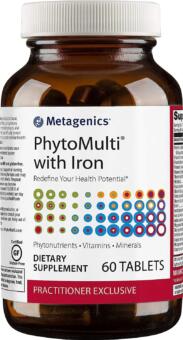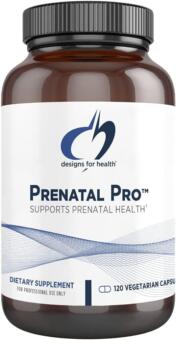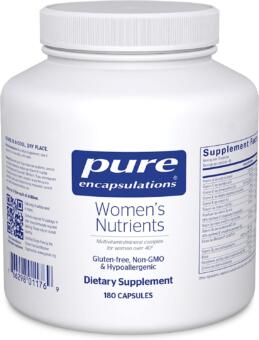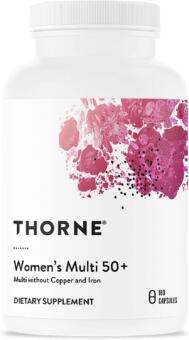Top 4 Multivitamin Supplements for Women
Discover the best multivitamin supplements and vitamins for women. Read the research and get advice about which supplement is best for you.

We all know it's possible to get most, if not all, of our nutritional requirements from foods, especially vegetables and fruits. Still, with today's busy lifestyle and the pressures of modern living, it's easy for our health to take a back seat. And you can easily go for days, if not weeks, without meeting your daily vitamin and mineral requirements.
Unfortunately, we don't get the recommended 2 cups of fruit and 3 cups of vegetables daily. In that case, we miss out on essential nutrients that help protect our bodies against cancer, heart disease, strokes, and other health conditions.
But the stats show that upwards of 76% of us adults in the US don't eat enough fruit, and even worse, 87% of us aren't getting enough veggies either. In fact, only one in ten adults in America gets enough fruit and vegetables.
So, where does that leave us?
Multivitamin supplements are a daily commitment to our health to ensure that we give our bodies the important vitamins and minerals they need to perform optimally. So, when life happens (which it always does), we're better prepared to make up for the shortfalls so that our body always has what it needs.
Featured Women's Multivitamins in this Review Guide
What are the benefits of multivitamin supplements for women?
Made up of a combination of different vitamins and minerals, the content of different brands of multivitamins can vary widely. Sometimes called multi-minerals or multivitamins, multivitamin supplements are available in various forms, including gummies, powders, liquids, tablets, and capsules. Most multivitamins are designed to be taken once or twice daily, but make sure to read and follow the dosage instructions on the label.
The benefits of taking a multivitamin have been well-documented, and the advantages of taking a daily multivitamin have many advantages, including:
- Heart health, a recent study linked taking a multivitamin long-term (at least three years), was linked to a 35% decrease in the risk of dying from heart disease in women. Vitamins B1, B2, B3, B6, K1, CoQ10, and magnesium all have a role to play in promoting heart health.
- Cancer risk, the evidence for multivitamin use as a preventative measure for cancer in women is mixed, although two studies (here and here) show a decreased risk of colon cancer.
- Brain function, studies show that taking a multivitamin regularly can improve mood (and memory in older adults).
- Eye health, a multivitamin can reduce the risk of developing cataracts and may slow (but not prevent) age-related blindness. Vitamins A, B3, C, E, and selenium, along with others, support eye health.
- Bone health, calcium and Vitamin D are both essential for bone health, so if your diet is lacking in either, you can benefit from a multivitamin.
- Energy, B vitamins, in particular, are linked to energy and improved neurological function, helping to decrease stress and anxiety.
- Relaxation, magnesium aids the body in relaxation.
- Immune boost, zinc, and vitamin C are linked to improved immune function along with vitamins D and E.
- Replenish water-soluble vitamins, vitamins B and C, that are taken in excess travel through the body and are not stored, which means that they need to be replenished daily.
- Hair and skin health, Vitamins B3, C, and biotin help with fuller hair, while Vitamins A, C, E, and CoQ10 are good for healthy skin.
- Healthy aging, as we age, our bodies may need additional nutrients, but we become less effective at absorbing nutrients which can be supplemented by a multivitamin.
How do I choose the best multivitamin for women?
The best type of multivitamin will depend on what vitamins and minerals your body lacks. In general, if you are struggling to sleep, are experiencing stress or a loss of energy, or have other, more specific symptoms, a multivitamin should be incorporated into your daily routine. This will help address any internal nutritional deficiencies and help you start on the road to better health.
But there are so many different options, so it can help to have some guidelines to follow. When making your decision, keep in mind the importance of USP verification, the specific vitamins that you need as a woman, choosing a formulation that matches your age and sex, as well as a few other factors that will impact your choice.
Make sure to consult a healthcare professional before taking any new supplements.
Multi With Iron
Metagenics - PhytoMulti® with Iron
Women who need a comprehensive multivitamin with added iron support especially beneficial for women of childbearing age.
- High-Quality Ingredients (3rd party tested)
- Improved Skin Benefits
- Boosts Energy
- Check iron levels
Metagenics PhytoMulti® with Iron stands out as a top-tier multivitamin option for women, particularly those in their childbearing years or those with a higher need for iron. This advanced formula not only provides a comprehensive range of essential vitamins and minerals but also includes a unique blend of 13 concentrated extracts and phytonutrients to enhance overall wellness and vitality.
There is also a non-iron version that might be more suitable.
Prenatal Support
Designs for Health - Prenatal Pro™
Provides a comprehensive blend of vitamins and minerals essential for pregnant women, including folate, iron, and iodine.
- Can be used before and after birth
- Methyl Folate, not Folic Acid
- GMP registered USA facility
- Not designed for non-pregnant women
Designs for Health’s Prenatal Pro™ is a comprehensive multivitamin designed with the unique nutritional needs of pregnant women and those trying to conceive in mind. Providing a balanced blend of essential vitamins and minerals, this product supports healthy fetal development and maternal health, ensuring both mother and baby receive the necessary nutrients.
Mid-Age Multivitamin
Pure Encapsulations - Women's Nutrients
Comprehensive multivitamin/mineral complex for women over 40, including calcium, Vitamin D, and antioxidant support.
- Supports breast and bone health
- promotes cardiovascular and skin health
- Contains Metafolin L-5-MTHF
- Tailored for women over 40
Pure Encapsulations Women's Nutrients is tailored to meet the nutritional demands of women over 40, offering a robust multivitamin/mineral complex that supports overall health and well-being. With added ingredients for breast and bone health and cardiovascular and skin vitality, this supplement is our top choice for women seeking comprehensive support in their 40s and beyond.
Over 50 Multivitamin
Thorne - Women's Multi 50+
Women aged 50 and above will most benefit from this multivitamin supplement.
- Contains optimal minerals for bone health
- Support for cognitive function
- Manufactured in the USA
- Specific to women over 50
Thorne’s Women's Multi 50+ is meticulously crafted to address the specific health needs of women aged 50 and above. With a focus on supporting bone health, cardiovascular function, and cognitive clarity, this supplement ensures that women in this age group receive optimal nutritional support to lead a healthy, vibrant life.
Vitamin Recommendations for Women
1. Folate (Vitamin B9)
- Importance: Crucial for preventing birth defects in the baby’s brain and spine, supporting cell production, and promoting heart health.
- Recommended Dosage: 400 mcg per day for adult women, 600 mcg during pregnancy, and 500 mcg while breastfeeding.
- Food Sources: Leafy greens, fruits, nuts, and beans.
2. Vitamin D
- Importance: Essential for bone health, immune function, and reducing the risk of chronic diseases.
- Recommended Dosage: 600 IU per day for adult women, 800 IU for women above 70, and 600-800 IU during pregnancy and breastfeeding.
- Food Sources: Fatty fish, fortified dairy products, and sunlight.
3. Calcium
- Importance: Vital for maintaining strong bones and teeth, nerve signaling, muscle function, and blood clotting.
- Recommended Dosage: 1000 mg per day for adult women up to age 50, and 1200 mg for women above 50.
- Food Sources: Dairy products, leafy green vegetables, and fortified foods.
4. Iron
- Importance: Essential for producing hemoglobin, reducing the risk of anemia, and supporting metabolic processes.
- Recommended Dosage: 18 mg per day for adult women, 27 mg during pregnancy, and 9-10 mg while breastfeeding.
- Food Sources: Red meat, poultry, fish, beans, and fortified cereals.
5. Vitamin B12
- Importance: Plays a crucial role in brain function, nerve tissue health, and the production of red blood cells.
- Recommended Dosage: 2.4 mcg per day for adult women, 2.6 mcg during pregnancy, and 2.8 mcg while breastfeeding.
- Food Sources: Meat, poultry, fish, and dairy products.
6. Omega-3 Fatty Acids
- Importance: Supports heart health, reduces inflammation, and is crucial for brain health.
- Recommended Dosage: 250-500 mg of EPA and DHA per day for adult women.
- Food Sources: Fatty fish, flaxseeds, walnuts, and chia seeds.
7. Vitamin C
- Importance: Acts as an antioxidant, supports the immune system, and aids in collagen production.
- Recommended Dosage: 75 mg per day for adult women, 85 mg during pregnancy, and 120 mg while breastfeeding.
- Food Sources: Citrus fruits, berries, tomatoes, and bell peppers.
8. Magnesium
- Importance: Involved in over 300 biochemical reactions in the body, supports muscle and nerve function, and maintains heart rhythm.
- Recommended Dosage: 310-320 mg per day for adult women, 350-360 mg during pregnancy, and 310-320 mg while breastfeeding.
- Food Sources: Leafy green vegetables, nuts, seeds, and whole grains.
Frequently Asked Questions
Women's Multivitamins
Yes, almost all multivitamins contain the necessary building blocks for improving your energy levels, but only if a nutritional deficiency causes your lack of energy. For example, an underlying thyroid condition or any other undiagnosed health issue won't necessarily be corrected by a multivitamin.
In many cases, especially if you are a vegetarian or vegan, you may be low in vitamin B12, an essential building block for the energy factories in your body. A multivitamin will usually include the recommended daily dose of B12, which should be enough to correct a deficiency.
Another source of low energy may be depleted iron levels in the blood. Many multivitamins include certain forms of iron, which can replenish iron levels in the body. But it's best to get advice from your doctor to ensure that the body can readily absorb the source of iron.
A healthy, nutritious, balanced diet is best, but this isn't always an option, and that's where multivitamins can help. By supplementing your diet with vitamins and minerals, you can help restore your body's equilibrium and prevent or slow the onset of diseases such as heart attacks, cancer, blindness, and more.
It also offers peace of mind as the stress of not eating enough fruits and vegetables every day can hurt your mental health. Knowing that your body is getting the nutrients that it needs daily can, therefore, be physiologically as well as physically important.
Multivitamins aren't essential for everyone, but there are benefits, particularly for older women who require additional calcium and Vitamin D. Vegans and vegetarians who follow a plant-based diet need to supplement with Vitamin B12 (found in animal foods). They may also need zinc, iron, Vitamin D, omega 3, and calcium, found in most multivitamins.
For most types of multivitamins, the time of day is not essential. But if you have a sensitive stomach, or it is indicated on the multivitamin label, taking it with food can minimize stomach discomfort. Another thing to remember when choosing the time of day is that calcium and iron bind together in the digestive process. To optimize the absorption of a calcium supplement (if you take calcium separately), you should do so at a different time to the multivitamin.
It’s important to consult with a healthcare professional before starting any new supplement regimen, especially if you are taking other medications, to avoid potential interactions.
While multivitamins are generally safe for most people, taking them in excessive amounts can lead to adverse effects. Stick to the recommended dosage and consult a healthcare professional with any concerns.
Conclusion
Incorporating a multivitamin into your daily routine can be a practical way to ensure your body gets the essential nutrients it needs to function optimally. By choosing a high-quality product that suits your individual needs, you can support your overall health and well-being. Remember to consult with a healthcare professional before starting any new supplement regimen, and consider factors such as your age, gender, and health conditions when choosing a multivitamin.
Whether it's higher levels of iron, a focus on bone health, a multivitamin for post-menopausal women, or a balanced combination of all the essential vitamins and minerals, you'll find the perfect choice on our list.














